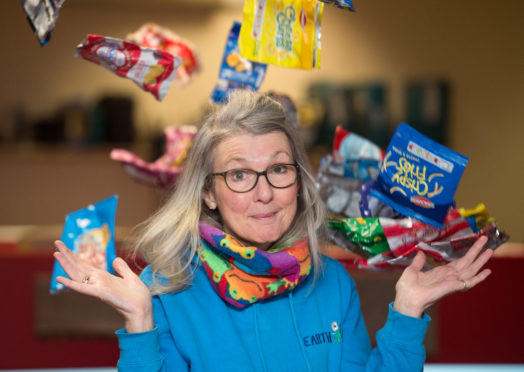A north-east recycling charity is aiming to cut down on the mountains of waste being produced over the festive period.
Elgin-based environmental group, Earthtime, is already running an initiative to convert empty crisp packets into plastic capable of being reused.
The rustling wrappers are currently not collected as part of recycling collections in Moray and are instead discarded into landfill.
Now the group is hoping to expand the amount of material that is able to be reused in order to cut down on waste being buried under the ground.
Deborah Hockney, Earthtime’s project manager, said that expanding imaginations was important to reduce the amount of rubbish produced.
She said: “By giving people the ideas, skills, encouragement and the venues to repair, up-cycle and recycle more stuff we can positively change behaviours towards consumption and repair.
“Moray Council already does very well with its recycling rate but there is still more that can be done to improve attitudes generally.”
>> Keep up to date with the latest news with The P&J newsletter
Collection points have been set up at Earthtime’s base on Elgin High Street to drop off crisp packets as well as plastic pet food pouches.
Facilities have also been made available to refill cleaning liquid bottles in order to encourage them to be reused instead of recycled.
Workshops are also being run by the group as part of its Up Project, which is supported by the Scottish Government’s climate challenge fund, to arm people with the skills to repair and reuse wood, textiles and furniture.
During 2017/18 initiatives run by the project diverted about 5,345kg of textiles and 213kg of textiles from landfill – saving the equivalent of carbon dioxide emissions of a car travelling 12,000 miles.
Zero Waste Scotland is organising its fifth Pass it on Week during March, which aims to encourage people to buy second hand items or repair goods they already own.
Chief executive Iain Gulland said: “One of the most heartening things about the week is that most of the activities we see are genuinely good fun and allow neighbourhood and workplace communities to really engage with one another.
“People take a fundamental pleasure in giving, as well as acquiring, and what could be better than seeing members of your community appreciating and enjoying something that you might, otherwise, have considered waste?”
